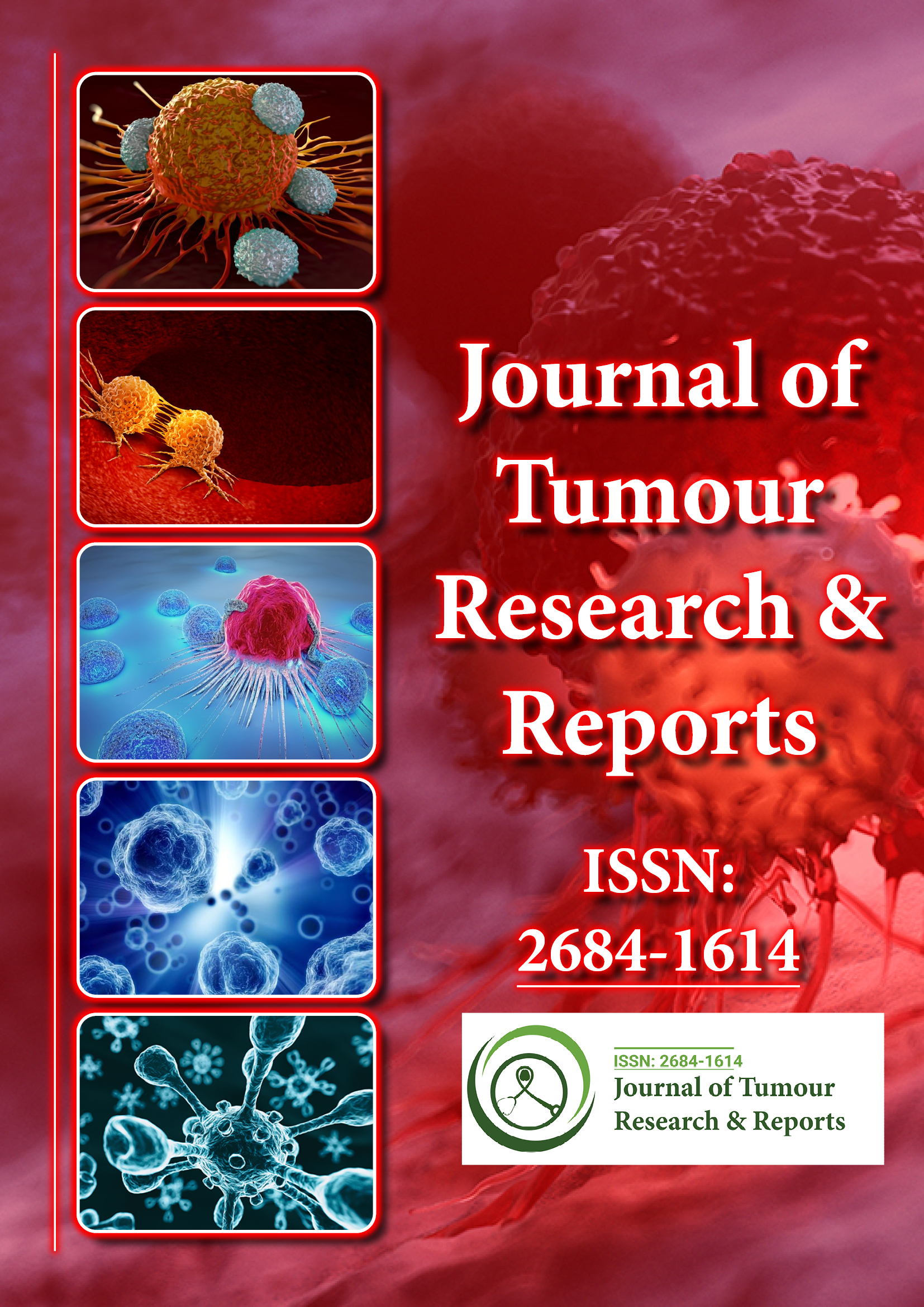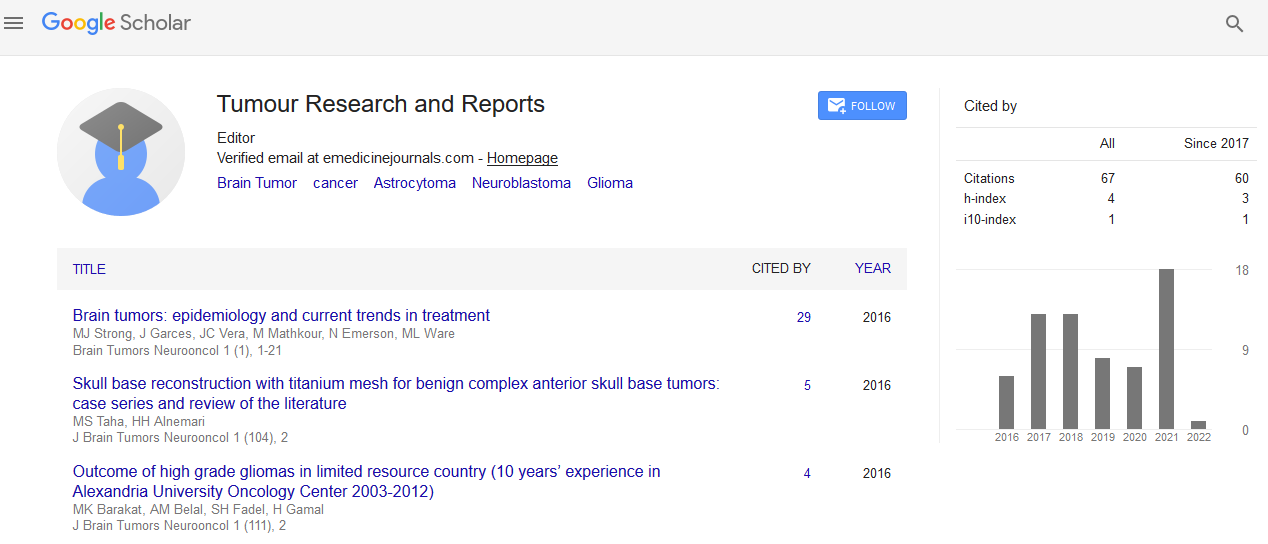Indexed In
- RefSeek
- Hamdard University
- EBSCO A-Z
- Google Scholar
Useful Links
Share This Page
Journal Flyer

Open Access Journals
- Agri and Aquaculture
- Biochemistry
- Bioinformatics & Systems Biology
- Business & Management
- Chemistry
- Clinical Sciences
- Engineering
- Food & Nutrition
- General Science
- Genetics & Molecular Biology
- Immunology & Microbiology
- Medical Sciences
- Neuroscience & Psychology
- Nursing & Health Care
- Pharmaceutical Sciences
Commentary - (2023) Volume 8, Issue 1
Approaches for Targeting Tumour Metabolism during Cancer Therapy
Luice Grant*Received: 01-Mar-2023, Manuscript No. JTRR-23-20319; Editor assigned: 03-Mar-2023, Pre QC No. JTRR-23-20319 (PQ); Reviewed: 20-Mar-2023, QC No. JTRR-23-20319; Revised: 27-Mar-2023, Manuscript No. JTRR-23-20319 (R); Published: 04-Apr-2023, DOI: 10.35248/2684-1614.23.8.180
Description
Cancer cells have a unique metabolism that is distinct from normal cells. This metabolic reprogramming is essential for cancer cell survival, growth, and proliferation, and it represents a potential therapeutic target for cancer treatment. In this article, they will discuss the emerging field of targeting tumour metabolism as a novel approach for cancer therapy.
Cancer cells exhibit increased glucose uptake and glycolysis, even in the presence of oxygen (aerobic glycolysis). This process, known as the Warburg effect, enables cancer cells to produce energy and biosynthetic intermediates to support their rapid growth and proliferation. Additionally, cancer cells rely on other metabolic pathways, such as the pentose phosphate pathway, the Tricarboxylic Acid (TCA) cycle, and fatty acid synthesis, to meet their metabolic demands.
Targeting tumour metabolism can be achieved through several approaches. One approach is to inhibit specific enzymes or transporters that are up-regulated in cancer cells. For example, hexokinase 2, which catalyzes the first step in glycolysis, is overexpressed in many cancer cells and can be targeted using small molecule inhibitors. Similarly, the glucose transporter Glucose Transporter 1 (GLUT1), which is up-regulated in cancer cells, can be targeted using small molecule inhibitors or antibodies.
Another approach is to target metabolic pathways that are essential for cancer cell survival. For example, the TCA cycle is critical for producing biosynthetic intermediates and energy for cancer cell growth and proliferation. Inhibiting enzymes in the TCA cycle, such as Isocitrate Dehydrogenase (IDH) or aconitase, can lead to reduced cancer cell growth and proliferation. Similarly, targeting fatty acid synthesis, which is essential for cancer cell membrane synthesis and signalling, can be achieved through inhibition of enzymes such as Fatty Acid Synthase (FASN).
Finally, targeting tumour metabolism can also be achieved through dietary interventions. For example, the restricting dietary glucose or amino acids, such as glutamine, can lead to reduced cancer cell growth and proliferation. Additionally, fasting or caloric restriction can alter cancer cell metabolism and sensitize them to chemotherapy or radiation therapy.
Several clinical trials have investigated the efficacy of targeting tumour metabolism in cancer treatment. For example, the IDH inhibitor ivosidenib has been approved for the treatment of acute myeloid leukemia with IDH1 mutations. Additionally, the FASN inhibitor TVB-2640 is being tested in clinical trials for the treatment of advanced solid tumours. Several other inhibitors of metabolic enzymes or transporters, such as GLUT inhibitors, are also in clinical development.
One of the advantages of targeting tumour metabolism is that it can be effective across different cancer types. For example, the Warburg effect is observed in many types of cancer, and targeting glycolysis can potentially be effective across different cancer types. Additionally, targeting tumour metabolism may have a lower risk of toxicity than traditional chemotherapy, as normal cells may have different metabolic requirements than cancer cells.
However, targeting tumour metabolism is not without its challenges. One challenge is the potential for tumour heterogeneity, where different subpopulations of cancer cells may have distinct metabolic profiles. Additionally, targeting metabolic pathways may lead to metabolic reprogramming, where cancer cells adapt to alternative metabolic pathways to survive and grow.
Targeting tumour metabolism is a promising approach for cancer treatment. Cancer cells have a unique metabolism that is distinct from normal cells, and this metabolic reprogramming is essential for their survival and growth. Targeting specific enzymes or transporters, inhibiting essential metabolic pathways, and dietary interventions can all be used to target tumour metabolism. Several clinical trials have investigated the efficacy of this approach, and inhibitors of metabolic enzymes or transporters are in clinical development. However, challenges such as tumour heterogeneity and metabolic reprogramming must be addressed to fully exploit the potential of targeting tumour metabolism in cancer therapy.
In conclusion, targeting tumour metabolism represents a promising approach for cancer treatment. The unique metabolic reprogramming of cancer cells provides potential therapeutic targets that can be exploited using small molecule inhibitors, dietary interventions, or other approaches. Advances in understanding the complex metabolic networks of cancer cells, combined with new technologies for drug discovery and clinical development, offer exciting opportunities for developing novel cancer therapies.
Citation: Grant L (2023) Approaches for Targeting Tumour Metabolism during Cancer Therapy. J Tum Res Reports. 8:180.
Copyright: © 2023 Grant L. This is an open-access article distributed under the terms of the Creative Commons Attribution License, which permits unrestricted use, distribution, and reproduction in any medium, provided the original author and source are credited.

